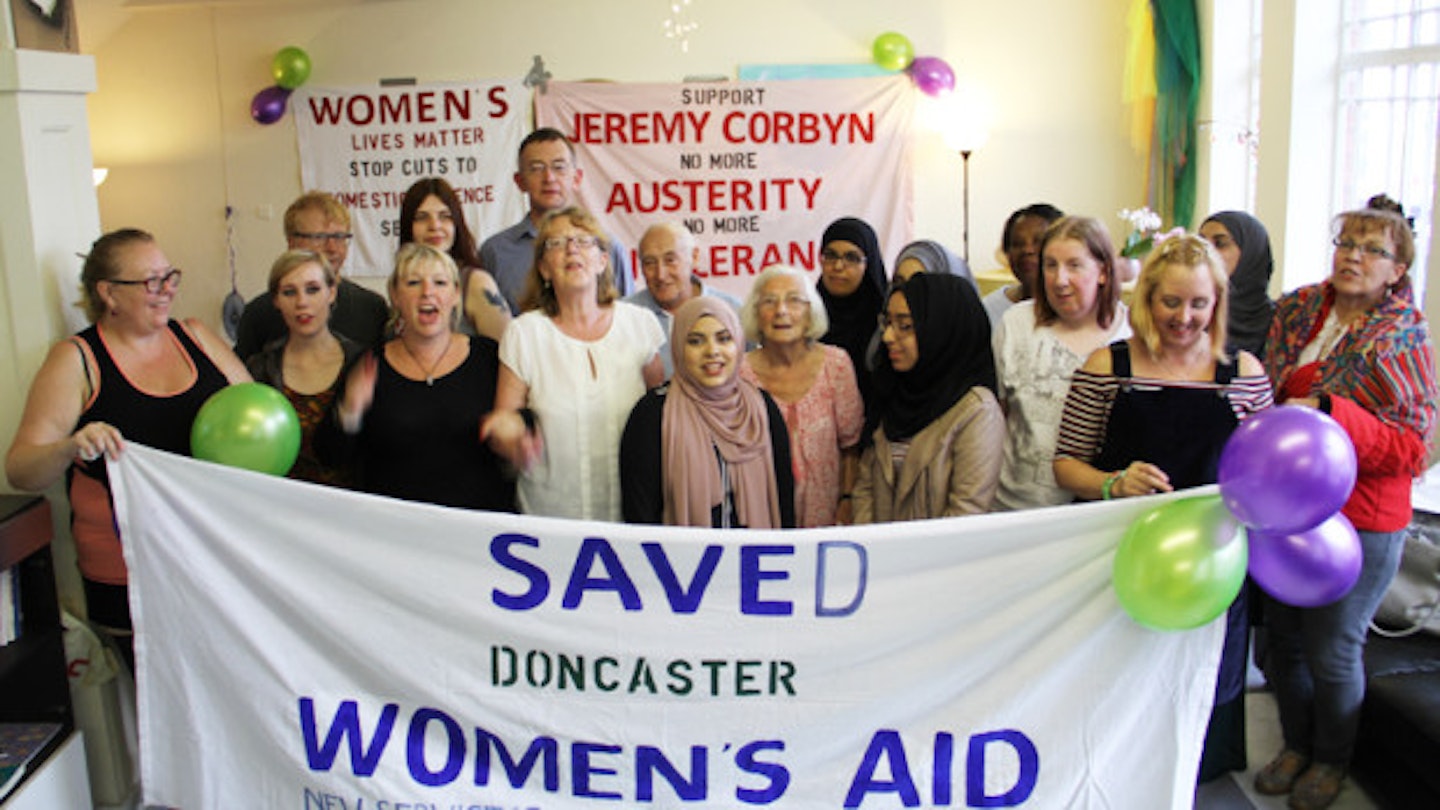Doncaster is just under two hours away from London by train. It is one of the places in England where the risk of living in poverty is relatively high. It has previously been named as a ‘hotspot for domestic violence’, with statistics showing 18 acts in the borough reported every day. In January of this year they were told that the city’s Women’s Aid would be forced to close.
On February 3rd Sisters Uncut received the following message via their Facebook page:
‘Hi, I’m a domestic abuse advisor in Doncaster ’til the 31st March. I work at the only Women’s Aid in South Yorkshire. I am devastated by the news that we are to close due to lack of funds….
We have the perfect storm in Doncaster; we have historic high rates of domestic abuse coupled with low wages and part time work for many women. There has just been the murder of a school girl and her mum in Leeds near us. Doncaster has just been told it has some of the highest rates of DV and child abuse in the country.
Cuts are destroying our town… our people… but women are taking the brunt of this with attacks from the state and within their relationships. I am grieving at not being able to do my job, but I am beyond worry for women in this town who Women’s Aid support. I am desperate for support’.
Out of necessity, Sisters Uncut Doncaster came into being. More than merely an outpost of the London Sisters, this group have gone on to affect real change in their community.

In March the BBC’s Question Time went to Doncaster. The subject was inheritance tax, following the Panama Papers expose. A woman interrupted the debate:
‘I find that question posed for Doncaster quite ironic. I see women, my friends, like myself, who are going to lose their jobs in two weeks’ time because the Tories have been stealing our tax. And domestic violence services are closing in two weeks’ time - it’s been here for 40 years. It’s closing because of the Tories.’
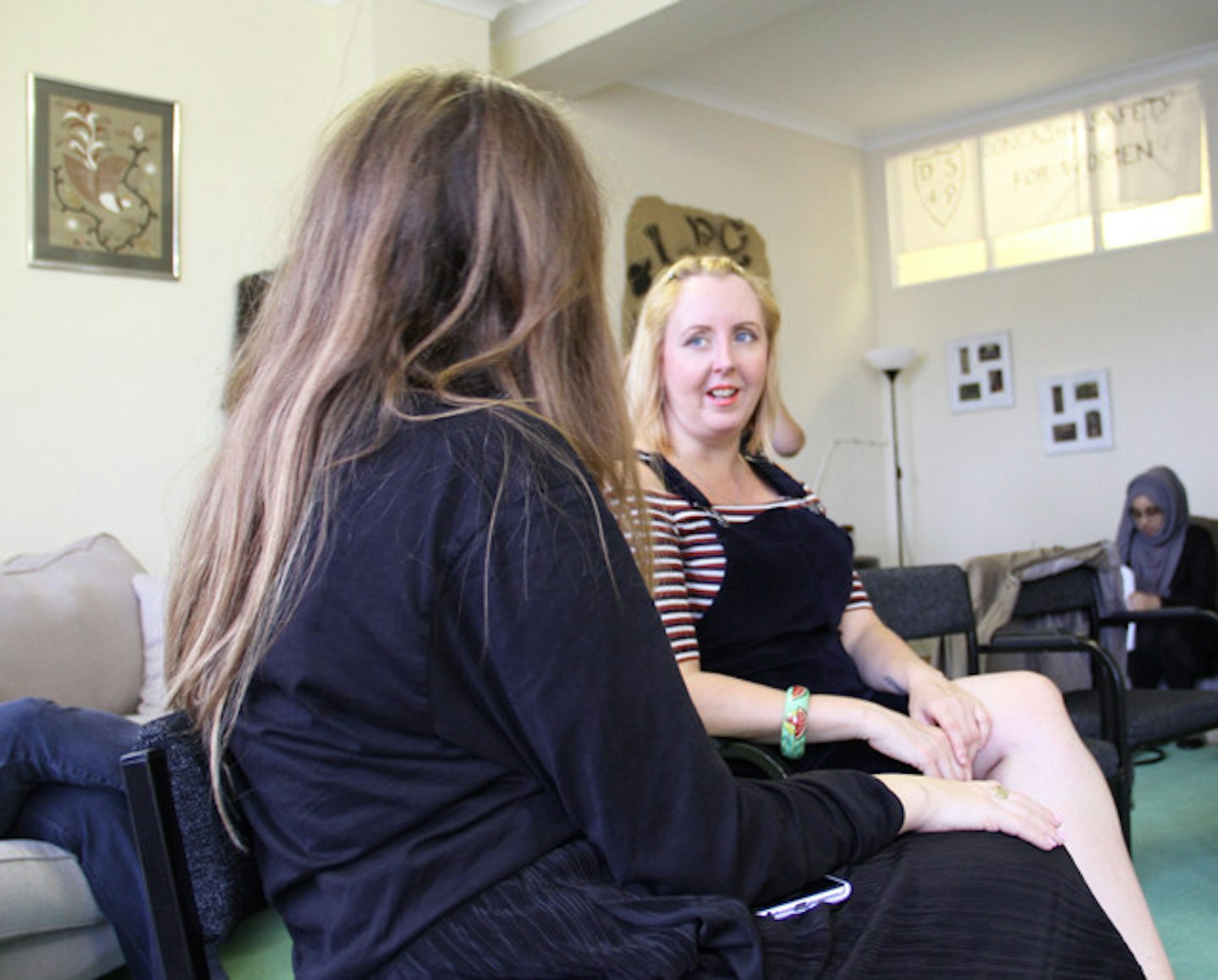
Last week, on an overcast August evening, Women’s Aid re-opened in Doncaster. The room was full of women, from their teens to their 80s, who’d come to celebrate and share their stories. There’s cake, tea and tears. Lois is 84, she’s been running self-defence classes for women in the area since the 80s and made many of the banners which decorate the room herself. I speak with Nadia, a young woman who runs a local Muslim youth community group. She’s brought members along to the opening, one of whom has come with her mother. They stand up in front of everyone and explain why they wear the hijab and what it means to them. Another woman who doesn’t reply with her name when I introduce herself, sits quietly at the back and just says ‘she’s glad to be here.’
Lou, who sent the initial email and spoke out on Question Time explains ‘we didn’t believe we could win or fight, so we hoped they could be our fairy godmothers, but [Sisters Uncut] were better than that. They gave us what we needed: confidence, strength and hope.’ Her voice begins to break a she speaks, ‘I’m sorry. It’s emotional. I’m exhausted…trying to pull together this new service again.’
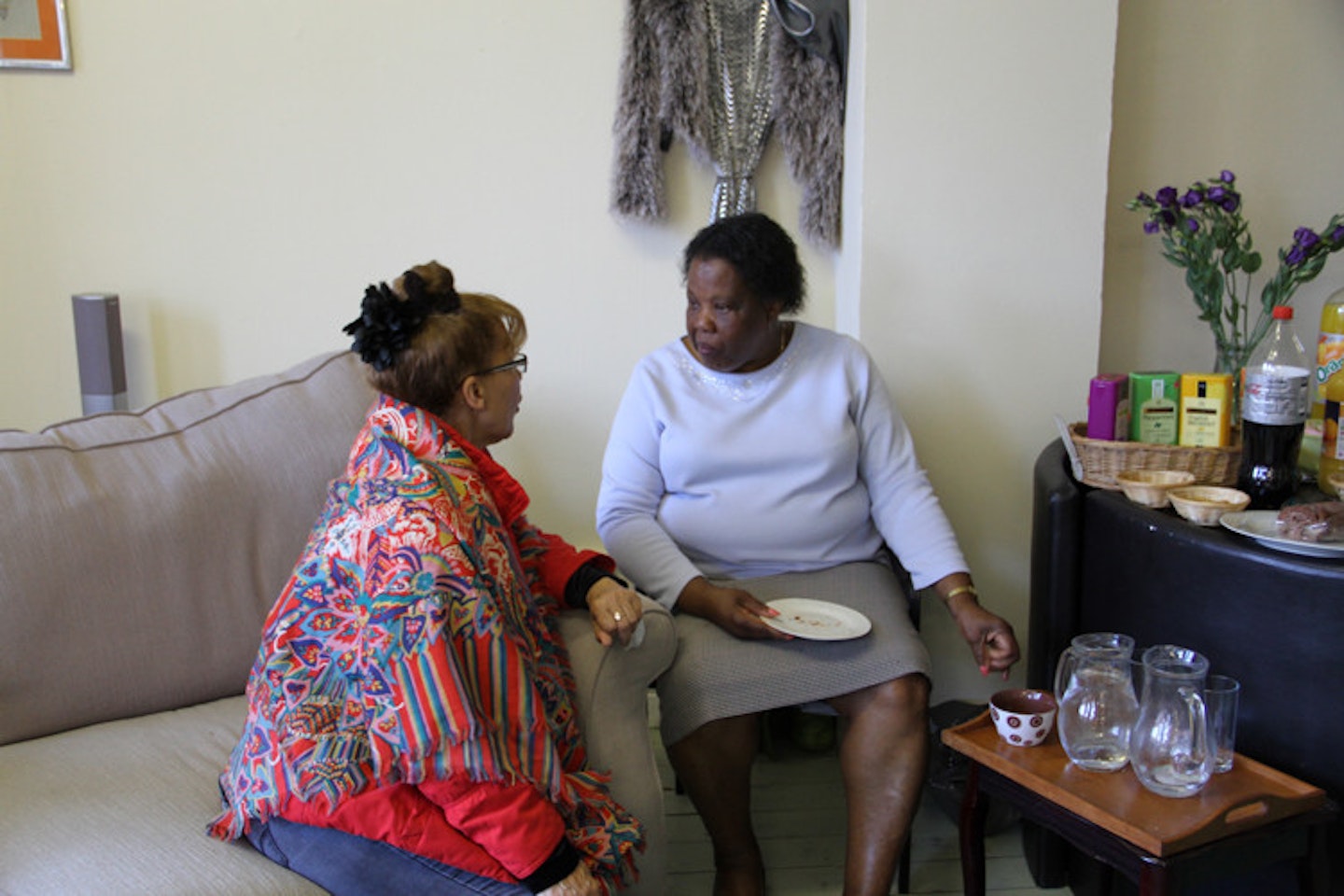
This might not be what you think of when you hear the name Sisters Uncut. You probably think of pictures of innovative direct actions: young women wearing black veils and carrying coffins pouring red dye into the fountains of Trafalgar Square or dressed in boiler suits adorned with green and purple text which reads ‘Sisters Uncut’ storming the red carpet at last year’s Suffragette premiere. You might have heard of these actions but you probably haven’t heard about the modest reopening of a women’s aid centre in the middle of the town in Doncaster. That is how Sisters campaign, they invade space, get in front of people and force them to confront the issue of cuts to domestic violence services. But it is not all they do. What has happened in Doncaster is the ends by which they justify the necessity of their means.
Anna, a member of Sisters South London, says ‘the media is really interested by young women doing things. They always mention that we play Beyoncé and dance. We enjoy that and we would do it anyway, beyond that we’ve got mums and people who are carers in our membership – we have caucuses within us – a parents and carers caucus, a sisters of colour caucus, a trans caucus, a disability caucus…of course what you see at our actions are young, able bodied women.’
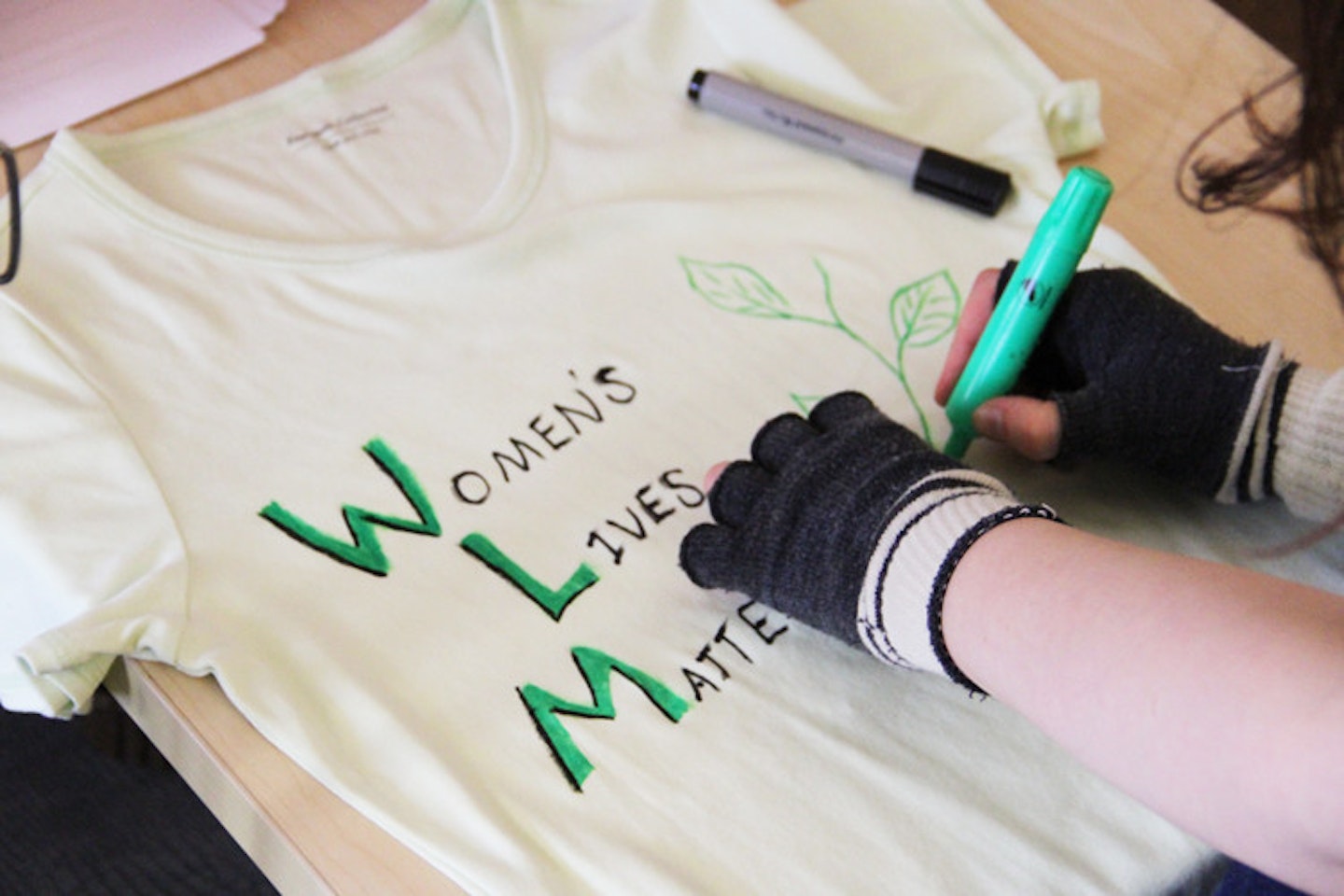
The way Sisters are portrayed does frustrate members of the group, ‘those of us who do the media side of things are really aware of our image and how it has come across – that we are young and female – the media loves to fetishise young women – even when we do our big marches we’ll have a really diverse group of people – in terms of ages and races – but the pictures that end up being taken and appear in mainstream media are of young, slim, white able-bodied women –that doesn’t reflect all that we are.’
Perhaps part of the reason why Sisters Uncut are so often fetishized by the media is that all that they are, to some extent, remains a mystery. This is part choice and part necessity.
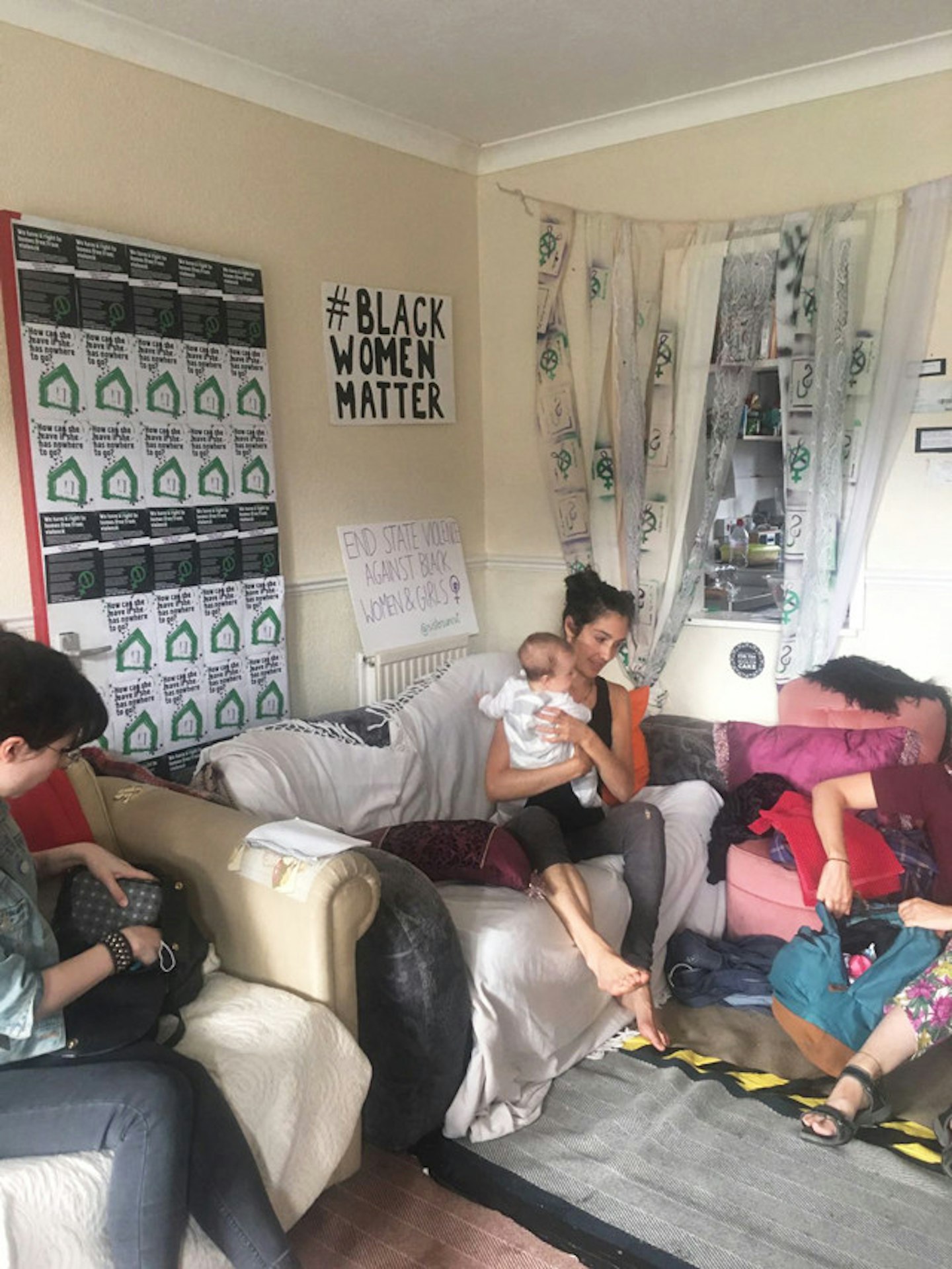
When it comes to protest, activism and direct activism as much anonymity as possible is par for the course. However, once again with this group their means are their message. Janelle Brown*, a member of Sisters North London, explains that it’s important that no sister gets more credit than another. ‘Overall we fight cuts to domestic violence services but, ultimately, what we want to do is fight male oppression and male violence. We operate by consensus; we come to a decision about how we will go forward without hierarchies.’ It makes sense and poses the question: can you ever challenge a system if you operate within it yourself?
‘We see a lot of hierarchies in activism and in politics’ Janelle says, ‘it just perpetuates the kind of structure that we are trying to fight against. We are creating the world we want to see through the way we operate.’
Our conversation on this topic is timely. In recent months the new has been dominated by the leadership contests of our mainstream political parties: who’s in, who’s out, who’s up, who’s down. Shakespearian psychodrama meets HBO. You could be forgiven for having forgotten that politics isn’t actually about personality.
It’s this vying for power that Sisters Uncut have bypassed. ‘I think issues – like the problem with male violence’ Janelle says, ‘are much bigger than the individual. It’s a structural problem that’s going to take a mass movement and a huge shift in social values and consciousness to get rid of.’
Such movements away from entrenched thinking and shifts in the status quo ‘rely on a critical mass of people getting involved’ she adds. ‘It’s not a challenge to the existing ego problems of politics if we replicate the very system that perpetuates it. We stay clear of the structures of traditional politics. We know that to get to where we want to be we need to be making it clear that no sister is any more important than another. We are creating the world that we want to live in, society makes people feel shit, especially as a woman it puts you in your place.’
It’s Janelle with whom I travel up to Doncaster by train, we don’t chat much as she has admin to do for Sisters. She’s been involved in the group since it’s second meeting. Sisters Uncut was formed in 2014. ‘I was working in the domestic violence sector. I saw the cuts happen and witnessed how they were impacting on survivors. The women I was supporting were facing homelessness or possibly returning to a partner – they were representing themselves in court. As a sector worker there’s only so much you can do so joining Sisters Uncut was a way to do something about it.’
When we arrive we’re greeted by member of the Doncaster group, the two of them are excited and, clearly, emotional about the event. This is an important moment, moths of work and campaigning have taken them to this point. An email sent back in February out of hope has brought us all here, to the freshly painted Women’s Aid HQ situated above the city’s food bank.
At the launch Janelle hangs back, chatting to people, taking pictures and helping out but, she makes it clear that this is about the Doncaster Sisters.
‘Sisters as a group is just practical and down to earth’ she tells me. ‘The issue we are dealing with is “is a woman’s life worth saving”. It’s urgent and its really quite sobering. We don’t have time to mess around because there’s a huge problem that we all need to get involved with. It’s always as many hands on deck as possible.’
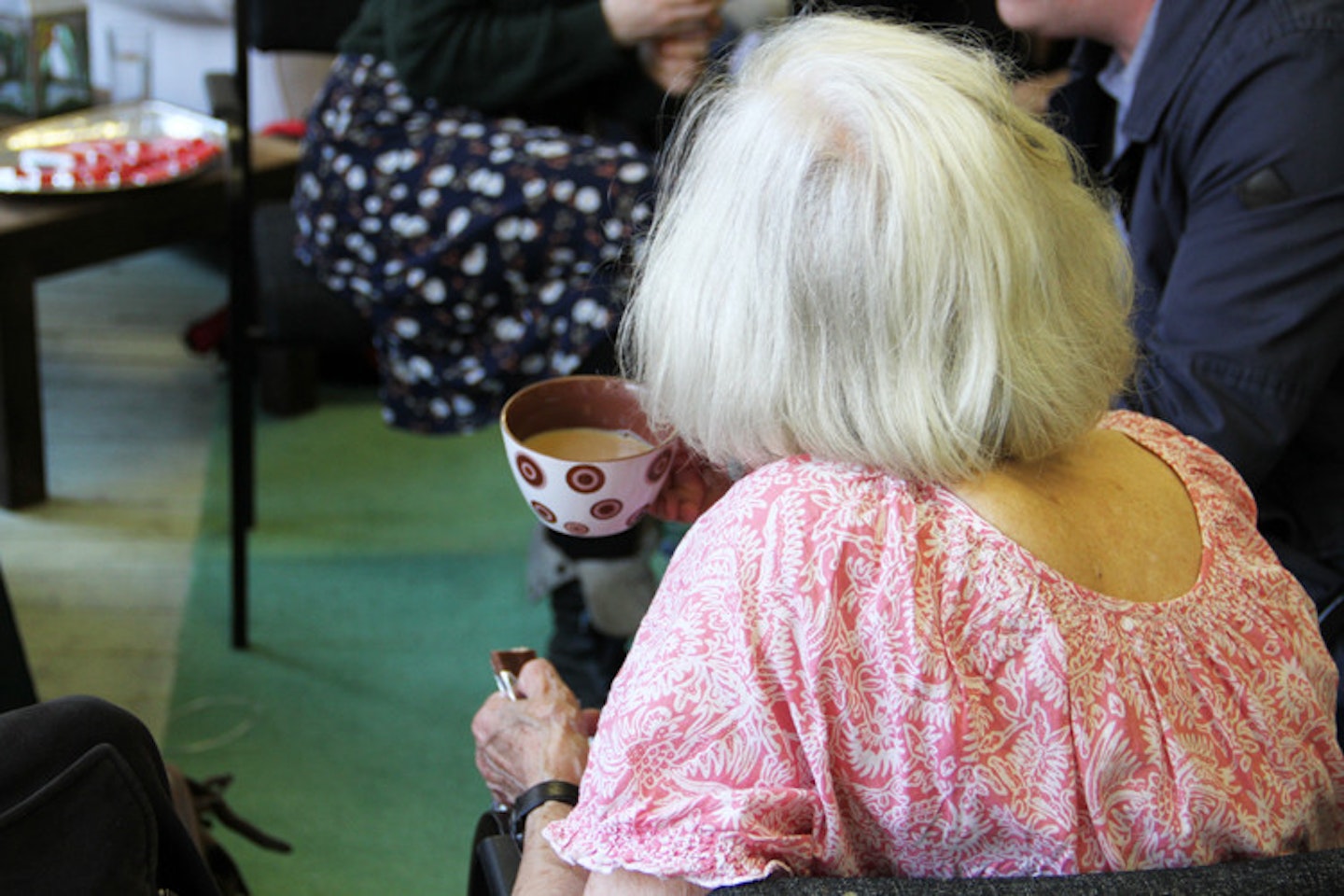
A representative from the local branch of the TUC to join in the celebrations, he’s chatting to Lois. This is old politics meets new politics. I ask Janelle again about the group’s structure, ‘I think focussing on individuals does distract from the structure. Even the way you see domestic violence cases reported on in the papers is always about a “monster”, but it’s never just about the individual. It’s a homogenous narrative. Sadly, this is happening on a mass scale.’
I ask Lou who has been working for the local council for years, about how her relationship with Sisters Uncut has developed since she reached out to them in February. ‘When I messaged Sisters it was late at night. I was absolutely racking my brain after I had found out that Doncaster Women’s Aid could be closing at the end of the following month. We had 6 weeks to campaign to save our service. They got back to me that night. The rest is history.’
On the ground in Doncaster Lou says she knew ‘people who would support this but I just didn’t know how we would do it. I had seen them [Sisters] doing stuff. I saw their suffragette protest on the news and I was bowled over. I just thought they were phenomenal. I couldn’t understand why there wasn’t a national campaign. They were so vocal, we should all have been doing what they were doing.’
When Sisters Uncut protested at the Suffragette premiere they hadn’t yet divided into regional groups. Sisters Uncut South and East London both tell me that it was after the red carpet stunt that people began to join the group in great numbers. ‘We had 60-90 people at a meeting. It got too big’ they tell me, ‘This began to impact both on our space and also on the safe spaces we wanted to create in our meetings. We made the decision to grow into three separate groups – North, East and South London.’
Anna from Sisters Uncut South London says ‘what happens at a meeting is that we have items on an agenda and we discuss them. If anyone has a proposal relating to that agenda, then we will discuss it – if it has consensus then it passes and we do it…there’s a lot of discussion and it isn’t easy. Consensus is a lot harder than voting, straight up democracy or whatever. But, at the end of the day, people are happier in the long run. In Sisters we are never going to find ourselves in a Brexit situation where 52% of the room are happy and 48% aren’t.’
It’s in the last year that the group has gone national, hearing from women all over the country. They now have Doncaster, Newcastle and Portsmouth branches all focussed on local services, particularly housing provision for domestic violence survivors.
Lou says that because Doncaster has high reported rates of domestic violence this issue is felt acutely by the community. ‘Everybody knows somebody who’s gone through it and the stories are awful. What was important for our campaign was that it allowed women to feel supported – a lot of the women involved had gone through different things that they’d never talked about – they never thought this would be a political issue. We said the personal is political and women shouldn’t have to suffer in silence on their own.’
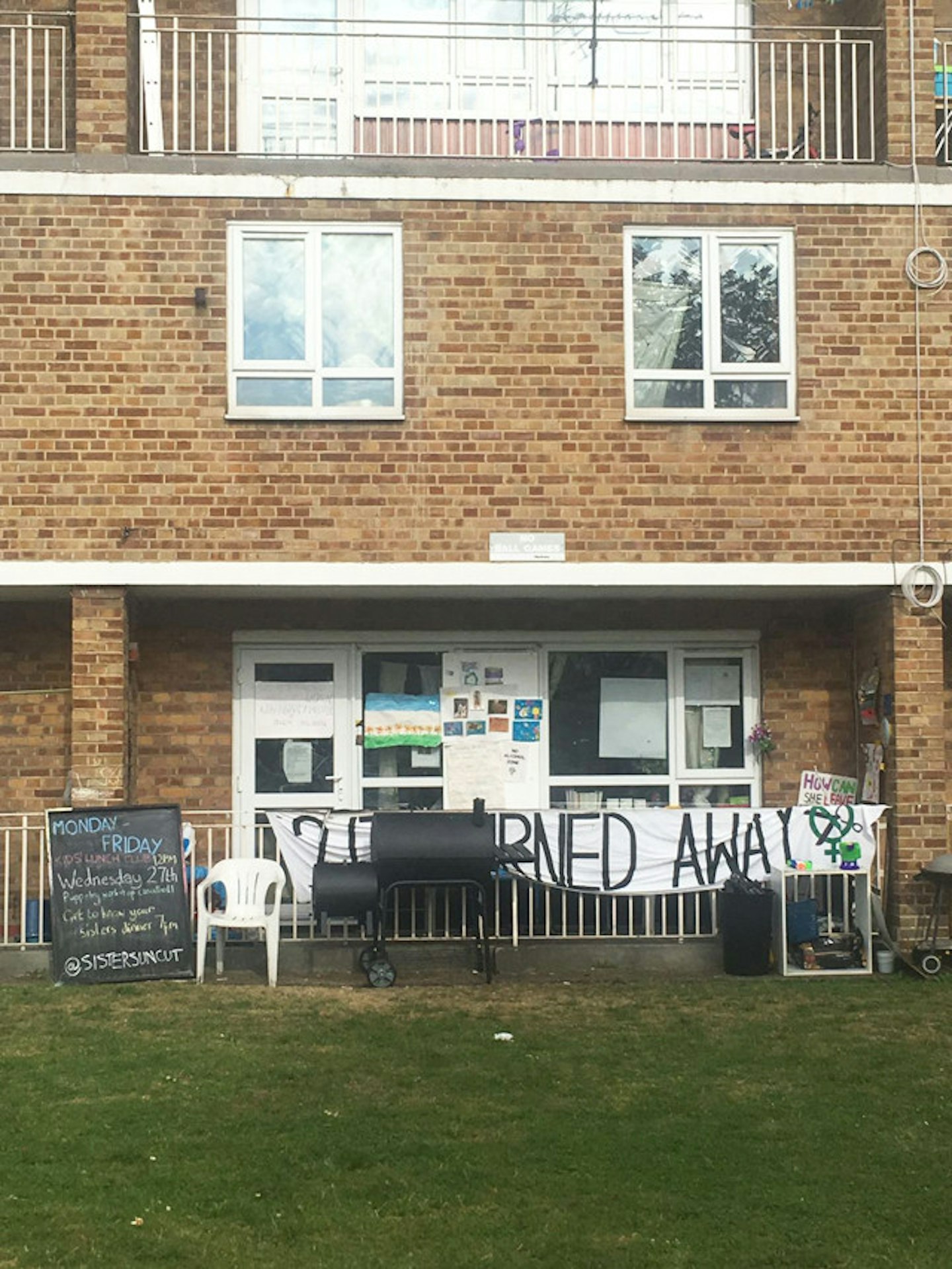
The impact of the Doncaster campaign is bigger than reopening Women’s Aid, despite the mammoth achievement that this is in its own right. ‘We’ve changed the way politics is done in Doncaster. We’ve put women’s issues at the centre. Women should have a say in how services are run.’
‘We want people to copy us’ Lou says, ‘we want this to grow. All over the country’. It’s fitting that Sisters Uncut Newcastle are also present at the launch. ‘We hope that we will always be part of Sisters Uncut. They’ve helped us and we’ve helped them. We feel like we’re making history together’ Lou adds. ‘You need the confidence of the youth which we see in London Sisters Uncut – it’s a lot of young women – and we need that – we needed the younger women to come forward and say our generation is not taking this and that helped us so much – we just thought if they can do it we can do it. They are so passionate about fighting domestic violence closures and highlighting the issue, to take that out of London and put it into a town like Doncaster which is much smaller than a big city. It shows that it’s the same tactics that need to be used everywhere – direct action.’ Her voice breaks a bit, ‘it’s been a bit emotional over the last few days’, she says.
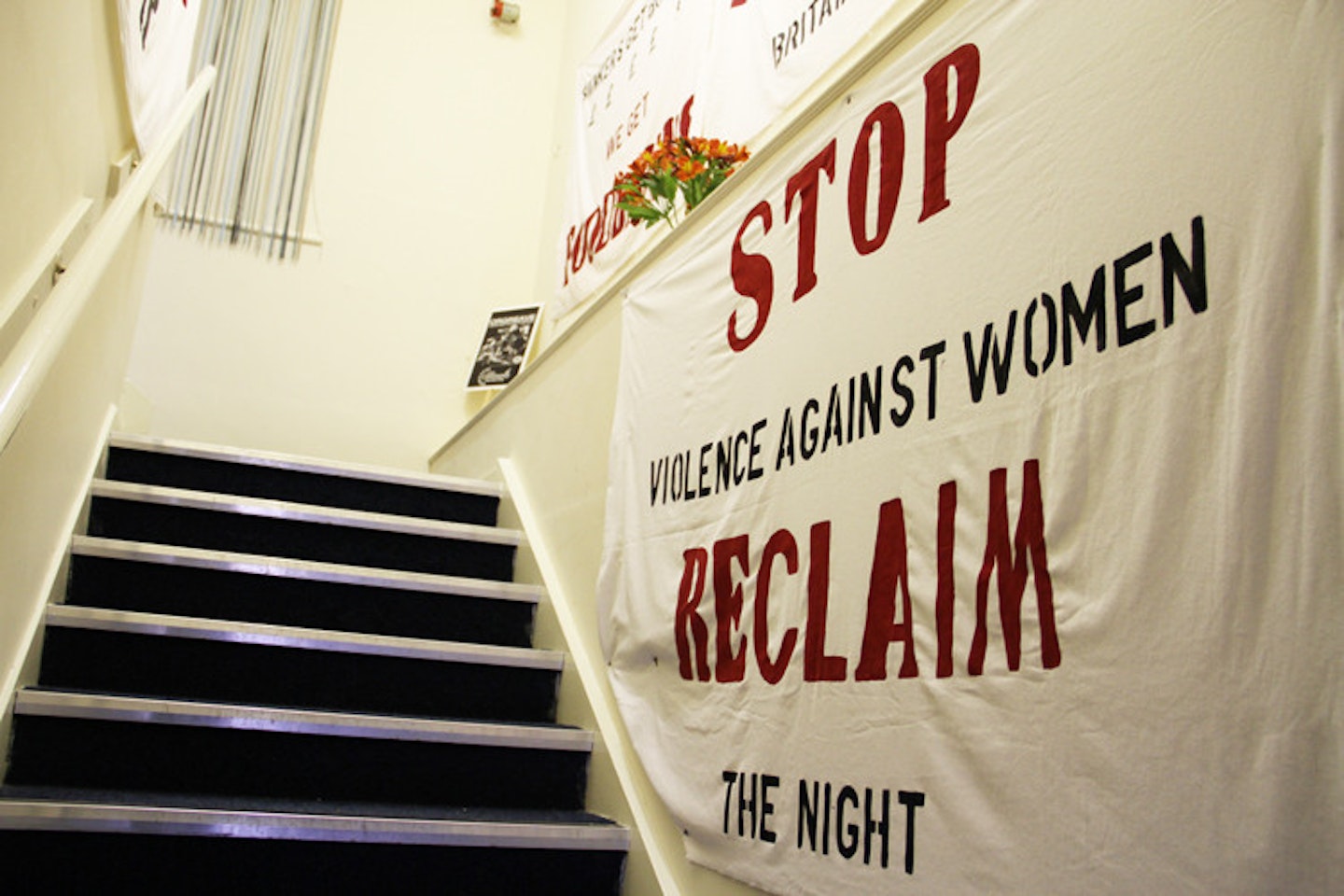
Back in London, a week after the event in Doncaster, I ask Janelle how she feels reflecting on it. ‘It feels like we are making an impact’ she says, ‘not just in terms of making the cuts visible but involving women who have never really taken political action before, or who have been historically excluded from mainstream feminist movements, particularly working class women or women of colour. We are coming together in safe spaces and working out what their liberation looks like…fighting for that freedom, with no sister left behind.’
When she joined Sisters back in 2014 is that we she hoped for? ‘Back then there were 10 of us in a room. We had a sense that there if we didn’t do this nobody else would. Now there must be around 400 sisters in the UK – the same thing still applies: if we don’t do it nobody else will. We knew it was going to take a mass movement to push back against these cuts and its actually happening and it’s picking up pace…’
The day after my trip to Doncaster I went to visit an occupation in Homerton, Hackney which has been organised by Sisters Uncut East London. It’s on the Marian Court estate where many homes are currently empty. In the borough of Hackney, according to a Freedom of Information response, there are currently 1,047 empty council-owned homes.%20). However, when I asked the council about this they dispute the figure and say it was provided via Freedom of Information by mistake.
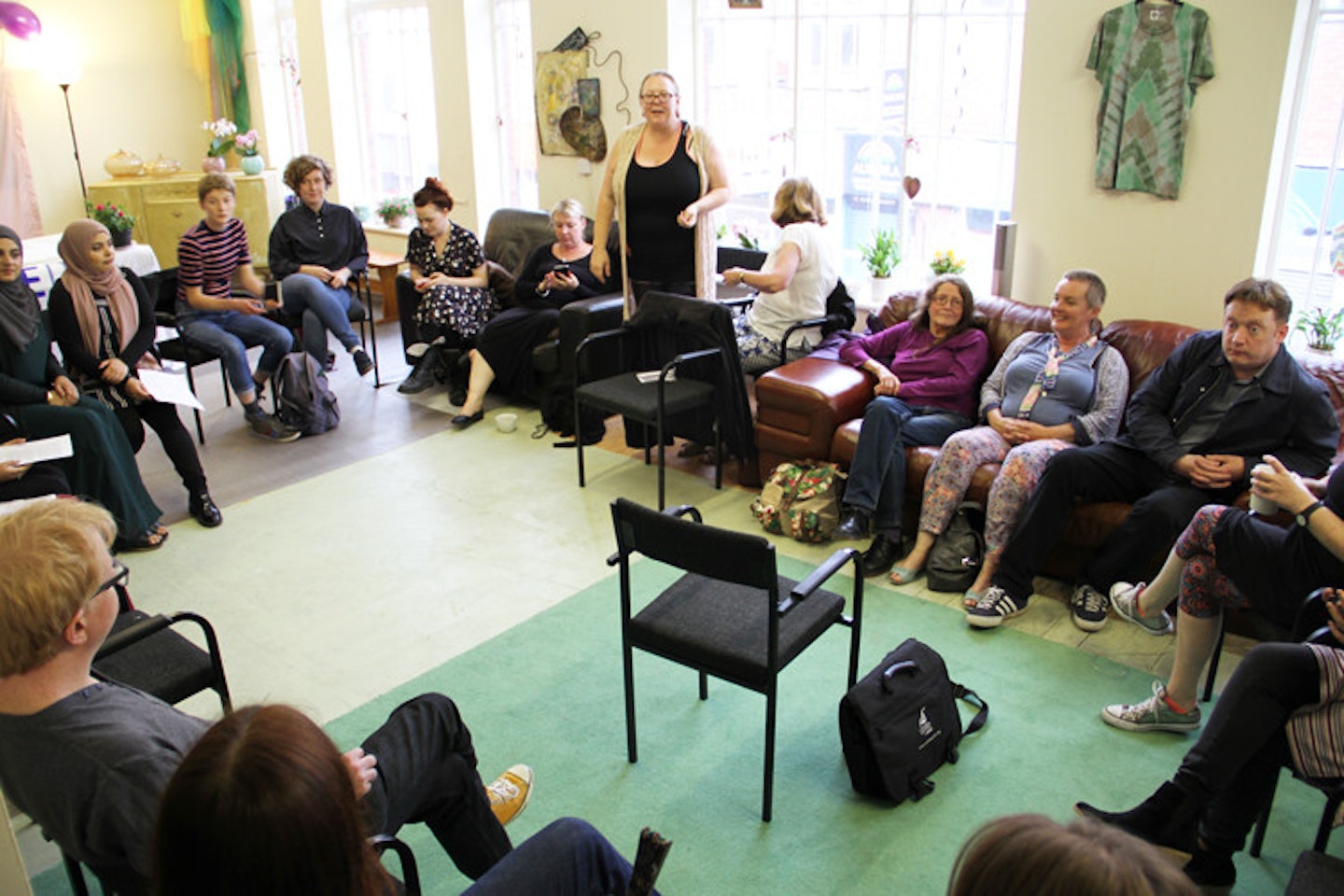
This occupation follows one organised by the Group in South London which has just finished. They are both drawing attention to the fact that a domestic violence survivor was turned away and denied housing back in May, despite seeking help from her local London council so that she would not have to return to her partner. London is, undeniably, the heart of this country’s housing crisis.
As I enter the Homerton occupation I’m greeted by women of all ages, some are breastfeeding in the living room. Another is tidying. Upstairs the bedrooms are all currently occupied and the walls in the hallway display both squatter’s guidelines and Sisters Uncut’s advice on how to create and manage safe spaces. At the occupation Sisters Uncut run a breakfast club every morning and operate drop in sessions so people can come any time for a cup of tea. Nadine, from Sisters Uncut East London, tells me that 'the reception in Homerton has been amazing. People have come round, helped us to set up. Because we're running this as a community centre people come by and share their stories with us, a lot of people have actually joined Sisters.'
Nadine explains that the group met with Hackney's acting may, councillor Philip Glanville, the other week. 'None of our demands were met', she says, although they did come to the agreement that survivors of domestic violence would now only be housed in council owned hostels.'
I asked Hackney Council what they think of the occupation and this sort of direct action as a way of drawing attention to an issue. They couldn't comment on my specific enquiry because they are in the process of electing a new mayor, however a spokesperson said: 'We have had a constructive meeting with Sisters Uncut and we’re acting on some of their concerns – and we are meeting them again this week to progress our dialogue.'
‘I don’t think it’s a coincidence that East and South East London have focussed on housing’ Anna tells me. ‘Empty homes in Hackney and Southwark are all too common, yet these are both places where we have Labour MPs and Labour councillors.’
She notes that while ‘direct action’ such as a protest, stunt or occupation ‘isn’t for everyone’ it is working for Sisters. She explains, ‘direct action is such an aimless phrase it’s hard to know exactly what it means. Maybe before I joined Sisters I was a bit more reserved when it came to [protesting]. I wouldn’t have advocated resistance at a protest. But I got to a point where I realised that this is what’s needed for change.’
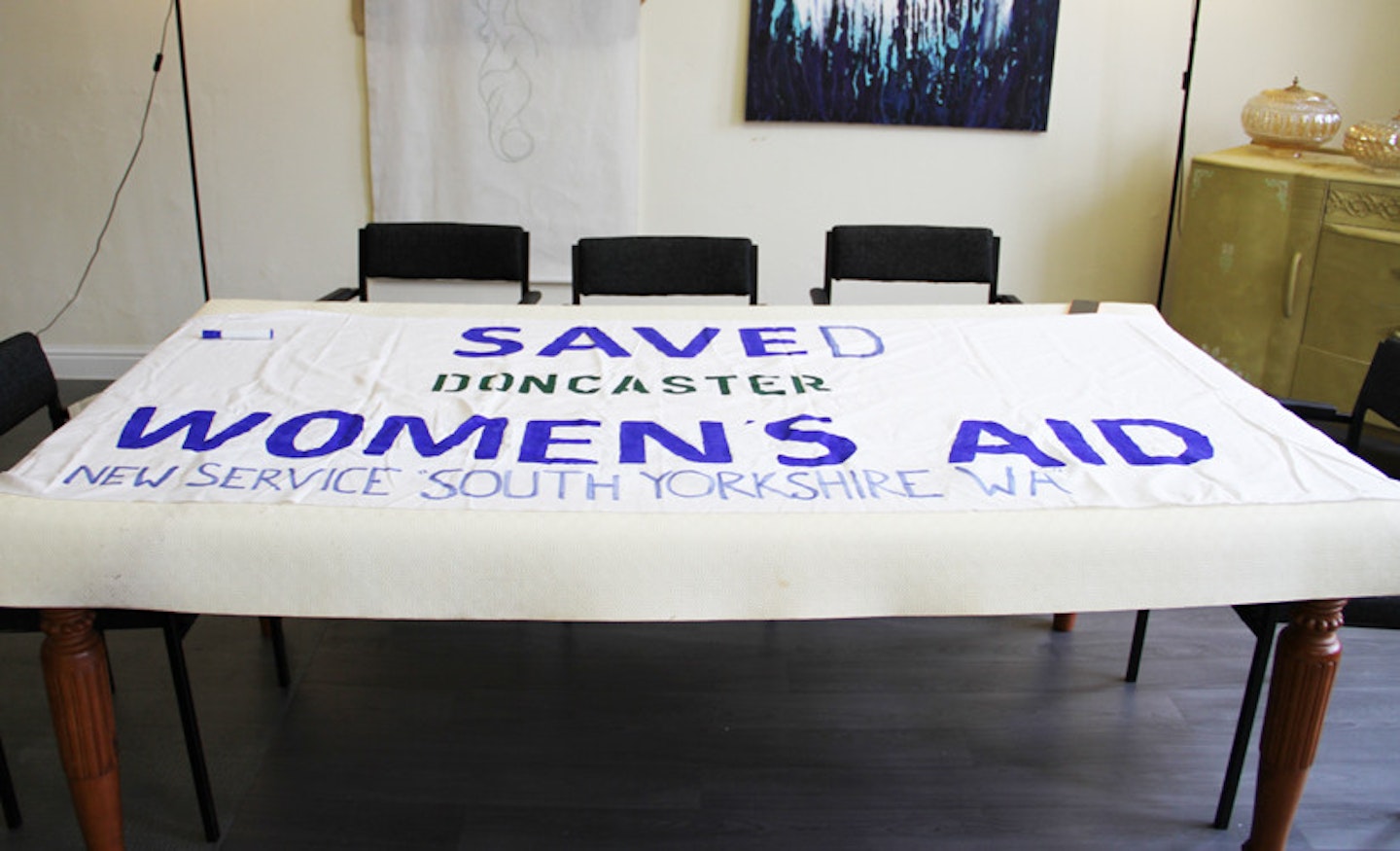
‘We hope people will see our protests and occupations and see how things work, how people are affected instead of just seeing it on the news and then forgetting about it’ she says. ‘We are winning, small and big. Panic rooms are classified as a spare bedroom under the bedroom tax – people are taking the government to court over this and winning – people need to know about that.’
I, like you, learned about the Suffragettes at school. I can’t remember when exactly, maybe Year 7 or 8, which would have made it 2000 or 2001 and put me at about 11 or 12 years-old. Their importance was clear to me then: they fought for women to win the vote and, in the end, won our place at the table of this country’s democracy. That’s pretty much where the lesson ended and, this could be my memory playing a trick on me, but I’m pretty sure our history teacher didn’t mention the word ‘feminism’ once. What I didn’t realise until much later was the Suffragettes’ enduring relevance, beyond limited cinematic historical portrayals like last year’s Suffragette, and the importance of feminism to our present and future.
Sisters Uncut have been compared to the Suffragettes. It’s not a surprising comparison, they received global coverage when they stormed the red carpet at the premiere of Suffragette and their colours are green and purple. The group had been campaigning against cuts to domestic violence services since 2014 and, suddenly, people were interested not just in what they had to say but in them. Who were this group of, predominantly young, woman making a fuss? Surely, though, it’s not only who that’s interesting but why and how?
As for the why: two women die every week at the hands of a current or former partner in England and Wales. According to Home Office figures, domestic violence also has a higher rate of repeat victimisation than any other crime. And yet, because of cuts imposed on local government by Government austerity measures currently fewer than 1 in 10 local authorities run specialist domestic violence services and out of the domestic violence services which have closed since 2010, 32 were specialist services for women from ethnic minorities. 2 out of 3 women who approach refuges for those suffering because of domestic violence are turned away.
You could argue that it is because of Sisters Uncut that these statistics are being discussed in parliament and reported on regularly. Through direct action they have done more than highlight the problem faced by domestic violence services in this country, they’ve begun to force changes and find solutions.
It’s now 2016 and, you might argue, feminism is more talked about and more visible than ever. You can buy it on sweatshirts, ingest it via the icing on cupcakes, look at it on billboards, read about it on the Internet and look at it on Instagram. Visibility, however, doesn’t equal viability. A superficial glance of all this could lead you to believe that feminism has been an unequivocal success and, even, shallowly conclude that it’s no longer needed. If you scratch the surface, however, you start to wonder whether feminism has been commercialised, co-opted by capitalism – packaged up and sold back to us to keep us idle.
However, feminism is, in essence, a political movement not a lifestyle. It is a means of pushing things forward, of ensuring progression. We’ve come a long way since the turn of the last century, when we celebrate the centenary of women winning the vote in a couple of years we will be able to do so triumphantly. But, we must not forget how far we still have to go, nor must we continue to fight for true equality. Hashtags are helpful, pictures do tell stories, statuses spread messages and clicks do spread ideas but they don’t always translate to IRL outcomes. As Dr Bernie Hogan of the Oxford Internet Institute explained when I interviewed him in 2014, ‘online networks are not the same as communities’. It’s not enough for us to promote causes via our Instagrams, Twitters and Facebooks, it’s our presence that is required. Online it’s all about you, or rather me. The Internet’s narrative voice is first person: ‘I like this’, ‘I think that’, ‘I went there’, ‘I did that’, ‘look at me, I am here’. We use networks to spread messages we agree with, we have to go out in to the community to affect change and help others.
Janelle tells me that joining Sisters has changed her approach to feminism. ‘I can say that, personally, the difference between offline and online activism is great. So much modern day feminism is based online but that’s nothing in comparison to being in that room, being in that safe space, taking to the streets, using your body and just being there. I can honestly say I’ve spent so much less time online since being in Sisters Uncut because I’m in a community. I would encourage all sisters to close your computer, get offline and go and find your sisters because that’s where the real power is.’
Activism is alive and well in 2016, more than this it’s just as necessary as it ever was. We aren’t there yet.
*Some names have been changed
You might also be interested in:
North Korean Defector Yeonmi Park Has A Message We Should All Listen To
The Forgotten Story Of The Women Behind The British Black Panthers
Follow Vicky on Twitter @Victoria_Spratt
This article originally appeared on The Debrief.
